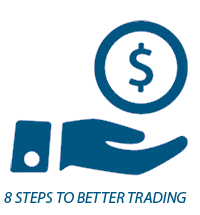Futures trading is a dynamic industry, with prices wildly fluctuating and changing based on demand. Before a trader starts taking a close look at the market, they should familiarize themselves with the many different types of futures orders to determine which best suits their needs.
Cannon Trading is a great resource to utilize when researching and participating in the futures market. Our dedicated team of futures brokers can help assist our clients with all of their trading goals, from finding a platform that best suits their needs to determining which investments best meet a clients' requirements.
We also offer various materials for our clients to use as they participate in the market. These tools make it easier to participate in the futures market, giving clients the resources they need to navigate the ever-changing market.
Futures Orders at Cannon Trading
Our team of brokers understands that it can seem challenging to determine what type of order best suits a traders' needs at a given time.
There are many different types of futures orders, all of which can help clients navigate the market in a particular way. With help from the Cannon Trading team, a trader can learn more about the market while accessing quality materials to help them navigate it.
Cannon Trading has helped traders since 1988 when our team gained a positive reputation in the futures trading community. In 1998, we became the first online futures trading brokerages, offering our services to clients nationally and internationally. Now, we are proud to serve clients across the world with all of their futures trading needs.
Since we started, we have strived to provide our clients with the necessary resources and tools to trade adequately. We work hard to ensure that our clients can navigate the trading industry, using futures trading best practices along the way.
We've listed some of the types of orders we offer at Cannon Trading below. These orders are essential to all types of traders, so it is best to understand them to make informed decisions about trading.
Market Orders
A market order does not specify a price; it executes at the best possible price available. This type of order prevents the customer from chasing the market or endlessly searching for alternate orders.
Market orders are a staple in the futures trading industry, as they allow a trader to sell or buy orders at the best price. This type of trade is usually immediate, giving the trader the ability to trade quickly.
People usually pick market orders because:
- They are immediately active
- They allow a person to interact with the market quickly
- The trader is guaranteed the trade
- And more
While there are many positives to using market orders, there are also a few negatives that people should stay aware of before utilizing.
Some of the most significant negatives to using market orders include:
- Liquidity
- No control over execution price
- Price changes quickly
To determine whether or not a market order would work best for you, we recommend doing plenty of research. Researching trends in prices and fluctuations in market value can help traders determine what type of order works best for their needs.
Who can benefit from using market orders?
Market orders are beneficial for traders who want to enter the market quickly and get out fast. Traders who utilize market orders often do so because they need to trade quickly, there is a chance of high volatility, or they would like their order to be filled immediately.
People who don't have time to wait for an order are more likely to pursue a market order since it is quick and easy to execute.
Limit Orders
The limit order is an order to buy or sell futures at a designated price. Limit orders available for purchase are placed below the current price, while limit orders available for sale place above the current price.
Though a market might touch a limit price, it does not guarantee or earn the customer a fill at that price. In many instances, the market must trade better than the limit price for a customer to get a fill. A limit order can remain in the market for several days or even weeks before it executes if you specify GTC, Good till Cancel.
Why Use Limit Orders?
Limit orders can protect gains, limit losses, limit price fluctuations, and maximize profits. It's essential to understand how limit orders work because there are different types of limit orders available. Clients should research the market before making any decisions regarding limit orders to ensure they find a type that works best for them. Think of limit orders as OR BETTER orders buy at a price or lower, sell at a price or higher.
Market If Touched (MIT)
MIT purchase occurs below the current price, while MITs for sale have a typical placement above the current price. This type of order is similar to a limit order since the specific price sees placement on an order.
An MIT order becomes a market order once the limit price is touched or passed through. An execution might occur at, below, or above the specified initial price.
Stop Order
Stop orders are instrumental in the world of futures and commodities trading.
They have three essential functions, which include:
- Minimizing a loss on a position
- Protecting a profit on an existing long or short position
- Initiating a new long or short position on “breakout”
A sell stop order can occur below the current market. It will happen only when market trades occur at or below the stop price. When a stop order occurs, the market order needs to fill at the best possible price.
Stop Limit Orders
A stop-limit order lists two prices total. It attempts to gain more control over the price at which the stop fills.
The first part of the order has the notation, much like a stop order. The second part of the order specifies the overall limit price. Once the stop triggers, a trader does not want the order to fill beyond the limit price.
While Stop-Limit offers more control on slippage it can also result in STOPS not getting filled due to market conditions, fast moves, gap moves etc.
Stop Close Only
The stop price on a stop close will only trigger when the market touches the stop during a trading close. The major disadvantage of this order type is a quickly moving market in the last few minutes of trading.
This fast movement can cause the order to fill at an undesirable price, which might not allow a person to return their profit.
However, the primary advantage to using this type of trading is that it protects the customer from getting filled during undesirable price fluctuations during the day.
Market On Opening (MOO)
This order type specifies that a customer wants to trade at the best possible price during the opening range.
Market On Close (MOC)
This type of order will fill during the final minutes of trading at whatever price is available.
One Cancels the Other (OCO)
This combination of two orders specifies that one order will stop the other order. This writing instructs the exchange terminals that when one side of the order fills, the remaining side of the order needs cancellation.
Placing both instructions on one order rather than two separate tickets eliminates the possibility of a double fill for the customer.
Order Sends order(s)(OSO)
Trader specifies the trading platform to send one main order and instructions of subsequent orders to follow if/once the main order is filled. Example may be to buy Crude oil futures at limit price below the market and send a protective stop and a profit limit if and when the order is filled.
Trailing Stop
Trailing stop is a moving stop order. It adjusts the stop price at a fixed percent or number of points in users' direction if the market moves in the same direction of the prediction. Trailing stop is “triggered” once a certain profit factor achieved and it will then move the original stop by percent or number of points/ ticks ( different trading platforms provide the user with different options)
Why Choose Cannon Trading?
We serve futures traders interested in trading several assets, not just the ones listed below. We offer futures trading on contracts involving oil, metals, and currency futures.
To learn more about futures trading or open an account with Cannon Trading, please visit our website at www.cannontrading.com.
Disclaimer
THE PLACEMENT OF CONTINGENT ORDERS BY YOU, SUCH AS A ‘‘STOP LOSS’’ OR ‘‘STOP-LIMIT’’ ORDER, WILL NOT NECESSARILY LIMIT YOUR LOSSES TO THE INTENDED AMOUNTS, SINCE MARKET CONDITIONS MAY MAKE IT IMPOSSIBLE TO EXECUTE SUCH ORDERS.









